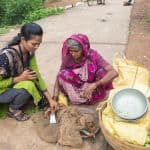Sustainable Solutions for the World’s Failing Food Systems: Acceso’s CEO Discusses its Innovative Approach
The war in Ukraine has weakened global food systems that were already reeling from the ongoing impacts of the COVID-19 pandemic – not to mention the ever-escalating challenges of climate change. In this atmosphere of constant crisis, innovative solutions are essential.
Acceso has taken that urgent need to heart, building an innovative, market-driven, farmer-focused approach to what’s becoming one of the most critical issues of our time. In the interview below, Acceso CEO James Jenkin discusses this model and its challenges and multifaceted impacts.
NextBillion: What are the main ways Acceso supports social enterprises, and can you provide an example of an enterprise you’ve supported that exemplifies the kind of impact you aim to make?

James Jenkin is the Chief Executive Officer of Acceso
James Jenkin: Acceso doesn’t just support social enterprises, we create them. Our unique model for economic development radically redesigns food systems by providing the missing market architecture that connects marginalized small producers to markets so that rural communities can prosper. Basically, we set up new social enterprises, which act as a ‘one-stop-shop’ to provide all the services farmers need – from training (digital and in-person), to inputs and credit to improve their productivity and meet the quality needed to trade with formal markets. Then we buy, aggregate and process their produce and sell it to the best possible market, providing a consistent and higher income for the farmer. Often, we also sell this produce to humanitarian programs, so we are not only providing income to farmers but providing locally sourced food to address food insecurity.
What our social enterprises are really doing is creating an entire ecosystem that connects smallholder farmers to the most advantageous markets for more suitable and profitable crops, building livelihoods that are resilient long into the future. We currently manage three social enterprises in Haiti, Colombia and El Salvador, with plans to scale our model across the region. Our enterprises support over 80 crops and sell these to almost 100 different domestic, export and humanitarian buyers.
This model has proven to be highly successful. In El Salvador, the Acceso model has led to an average increase of 250% in farmers’ incomes, with others seeing their income improve by as much as 600%. Furthermore, this model can be readily adapted to all sorts of challenges, from climate change to nutrition, migration and economic instability.
The Acceso model is a proven and self-sustaining approach, one which is restoring food sovereignty to Latin America and the Caribbean, and translating this into better livelihoods, greater food security and ultimately more stability.
NB: How have Acceso’s social enterprise partners fared during COVID-19, and what long-term impacts do you think the pandemic will have on them? Can you point to any adaptations made by these enterprises that have been particularly innovative or successful?
JJ: COVID-19 had a massive operational impact for Acceso and our social enterprise partners. First there were operational challenges, as we had to re-engineer our entire operational processes to make them safe. There were also market impacts: To take just one example, the closure of restaurants, hotels and many other hospitality businesses increased competition among agricultural enterprises aiming to supply supermarkets, which were one of the few food vendors that remained open. This impacted us, as in many markets we sell a substantial part of our farmers’ produce to supermarkets.
Acceso responded by supporting our networks’ efforts to adapt to these new conditions, and also to rise to the additional food and nutrition security challenges created by the pandemic. For example, Acceso Haiti restructured its school feeding program when schools were forced to close, pivoting to producing food kits that families could pick up monthly at our partner Model School Network sites. Similarly, in Colombia and Venezuela, Acceso networks ramped up delivery of fresh produce for kitchens operated by World Central Kitchen and The Wayuu Taya Foundation to help feed Venezuelan refugees, many of whom returned to the border as other economic prospects for them dried up.
In the long run, the pandemic has compounded every challenge that farmers face. We are still seeing the aftermath of this, with inflation increasing farmers’ cost of production, now compounded by shortages since the Ukraine war – and while food prices have also increased, those price increases are not always enough to cover the farmers’ costs. The real message from the pandemic is that we need more functioning local food systems that work for farmers, while providing critical food for local communities in times of crisis – regardless of what the next crisis will be.
NB: Why did Acceso decide to focus its work on food systems and smallholder farming, and why did you select Latin America and the Caribbean as your core region?
JJ: It’s clear that many of the world’s food systems are broken. Up to 811 million people faced hunger in 2020, in part because of the shock brought by the COVID-19 pandemic. Yet our food systems were failing before this point, and continue to fail now.
Previous interventions have too often focused narrowly on improving productivity alone, and not on building the functioning market systems that smallholder farmers need to be able to thrive and supply both local communities and the world with the food they need.
We’re currently focusing on Latin America and the Caribbean because agricultural development of this kind can address the complex social and economic challenges the region faces. For example, high levels of poverty and a lack of viable opportunities has meant that since 2014, more than 2 million people have left the Northern Triangle in search of better prospects. By creating economic opportunities for rural communities, we can ensure that families will no longer feel the need to make that heart-wrenching decision to abandon their homes and land. However, we believe that Acceso’s model is not only the best opportunity to create a genuine path to upward social mobility in the region – it can also be applied worldwide.
NB: What are the key areas enterprises, investors and support organizations like Acceso should focus on to improve food security in the region?
JJ: To improve food security in the region, we need more than just immediate food aid – although that is needed too. On the development side, we need to move beyond ad hoc interventions dedicated to single cash crops or locations. Instead, we need an alignment of resources and funds to accelerate the type of holistic systems and work Acceso is doing on the ground in many countries, while also creating blueprints for governments, donors, partners and practitioners to end the conveyor belt of piecemeal, short-term interventions. What is ultimately needed is a non-proprietary, sustainable open market system like Acceso’s, that can support multiple crops and sell these to multiple buyers and markets. This is not only the most cost-effective way to bring smallholders’ produce to market, it also enables farmers to grow the best crops for them – and it supports multi-cropping, which is better for the environment too.
In the long term, it is better for buyers to have more sustainable multi-crop supply systems. By partnering with national or multinational companies, supermarkets, or restaurants to serve as anchor buyers, social enterprise can leverage much-needed long-term infrastructure. Using social business as the intermediary structure enables it to trade off profit for impact, so it is always acting with the benevolence of an NGO towards the farmer.
NB: What is Acceso doing to tackle rural migration in the countries where you operate, and why is it important to find innovative solutions to this issue?
JJ: We have found that technical capacity building for rural, smallholder farmers can only go so far. Instead, what many smallholder farmers in the region need are the systems with which to engage with formal markets. This market access can provide them with a route out of poverty and a true path to upward mobility that prevents them from feeling the need to leave their communities, since migration is often driven by the search for better income opportunities.
In fact, we have found that Acceso’s model has led to a drop in migration among partnering farmers, with one study by NYU Wagner finding that 78% of farmers saw fewer young people leaving for the city and 85% reported a reduction in migration. Ultimately, we want to provide farmers with the best chance to remain and thrive in their local communities.
It is not for Acceso to take a position on whether individuals should migrate – that is a personal decision and mostly driven by necessity. However, we aim to provide rural communities with support and income opportunities so they can stay in their communities if they wish to do so.
NB: Acceso recently acquired the agtech platform Extensio. How will that acquisition help advance your mission, and do you have an early sense of the results so far? What potential – and possible challenges – do you see in embracing agtech solutions?
JJ: Extensio is an exciting opportunity to provide smallholder farmers who do not have access to technical assistance with critical information, such as weather and good agricultural practices, to improve their production and to build their capacity in a cost-effective way. Agtech isn’t a silver bullet that solves all the challenges that smallholder farmers face. But paired with Acceso’s suite of services, including eventual market linkages, it enables farmers to receive holistic, market-oriented support to increase their incomes. Technology can help achieve breadth of impact, but depth of impact is equally, if not more, important. And agtech needs to be one part of achieving that deeper impact.
The Extensio platform is also a great way to supplement other core trainings on other dimensions, such as boosting climate resilience, improving gender equality in agriculture and more. We have worked with more than 16,000 farmers in Haiti, El Salvador, Mexico and Colombia to date, and we are leveraging focus groups, surveys and a randomized control trial in El Salvador (with funding from USAID’s Development Innovation Ventures) to measure impact. Based on the initial surveys, we’ve had good early feedback from farmers: More than 80% have applied the information we’ve provided via Extensio, and 83% would recommend the platform to other farmers.
The main challenge for tech is designing for users, which is why we focus on utilizing SMS and WhatsApp to communicate with farmers, using tools they are familiar with rather than pushing new technologies. Content design is also critical – and it is a far more complex undertaking than many imagine. For instance, some of our farmers have limited literacy and are most certainly not familiar with technical terms. In response, we’ve developed all kinds of ways to present messages, including graphically through videos, and we use behavioral science to inform content design choices.
NB: What new or upcoming Acceso initiatives make you most excited for the future of the organization and the enterprises you support?
JJ: While we are very advanced with our core model, Acceso itself is an ongoing innovation that evolves with farmers’ needs and challenges, and we are always coming up with new things we can add to the model to increase impact.
For instance, Acceso has been working in reforestation to improve livelihoods through an innovative project in Haiti, in which two million fruit seedlings have been planted, the fruit of which Acceso will buy back. This is providing a commercialization platform to help farmers achieve sustainable and resilient livelihoods, as well as environmental outcomes.
Furthermore, Acceso is also innovating around the challenge of food insecurity, which is growing rapidly in our region: We have just reached 11 million meals provided for Venezuelans, both refugees and migrants in Colombia, as well as Venezuelan children in Venezuela. Acceso strongly believes that we should not be importing food aid, and that it should come from well-designed, inclusive and functioning food systems. In our feeding programs in Colombia, for instance, all of our food is sourced from local smallholder farmers, delivering impact for local communities across the board.
NB: In contrast, are there any emerging challenges facing Acceso and/or the enterprises you work with, which may require you to adapt your approach going forward?
JJ: Like most organizations, Acceso and our network is facing the challenges that come with an increasingly uncertain world – both economically and politically. For instance, we see this in Haiti where there is massive growing food insecurity due to economic and political instability, and in the Northern Triangle which, on top of COVID-19, has faced issues related to climate change and the growing number of migrating populations in the region. On top of this, as I mentioned above, inflation is impacting farmers’ cost of production, and price increases from end consumers are not always being passed back to the farmers.
Our work has delivered big improvements for farmers, but too many remain in a precarious situation. If the message before wasn’t clear enough, it should be now: Our food systems are failing, and we need urgently different models that can deliver the most impact for smallholder farmers, enabling them to both build their resilience to shocks and to thrive.
Note: Acceso is a NextBillion partner.
James Militzer is the managing editor at NextBillion.
Photo courtesy of Acceso.
- Categories
- Agriculture, Social Enterprise




